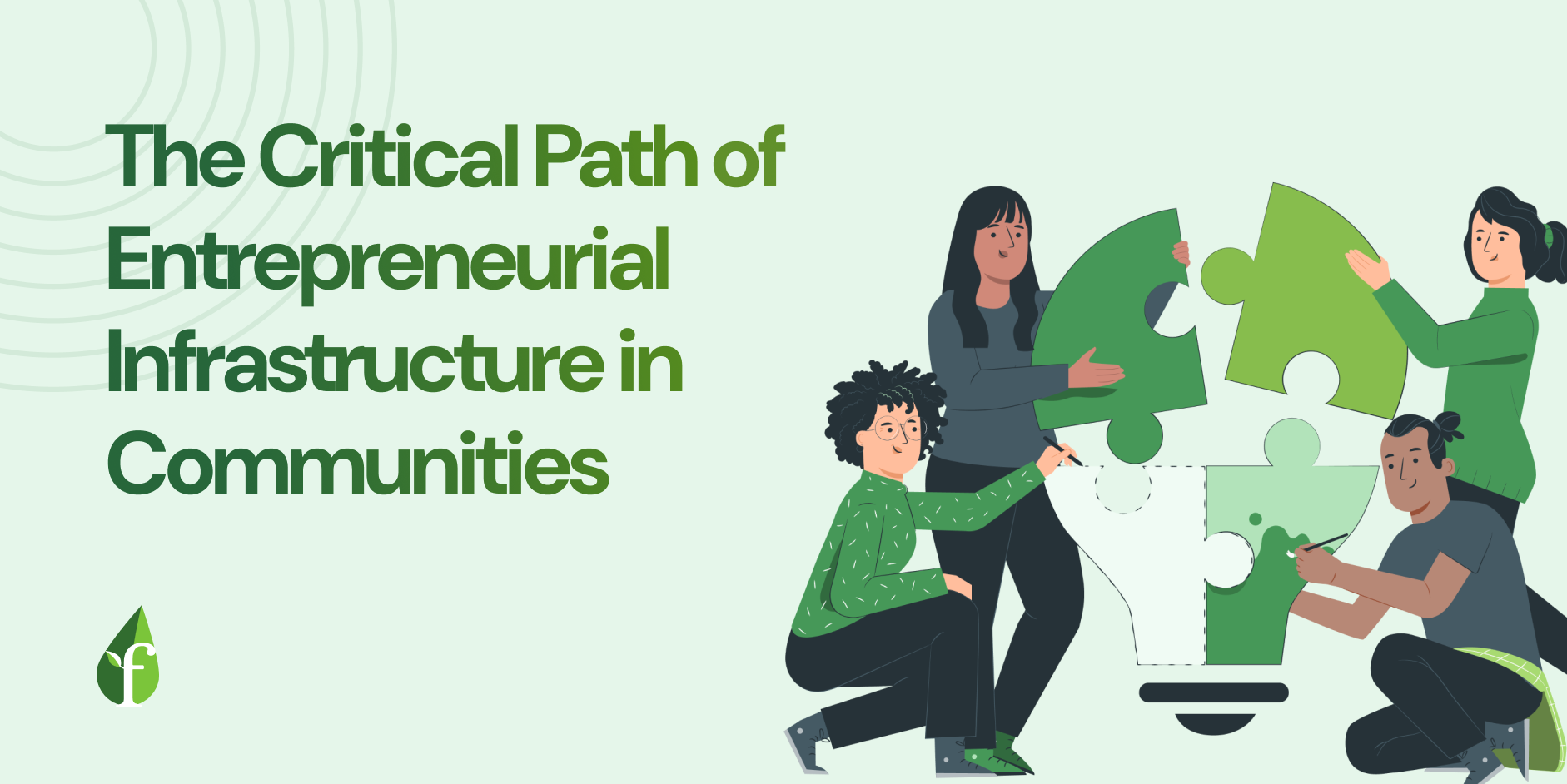
Governments keep insisting they’re "supporting entrepreneurship," yet the tools they fund are usually the bureaucratic equivalent of a pep rally: innovation hubs with free Wi-Fi, pitch competitions, and motivational speakers who read the same three startup books as everyone else. These things create the appearance of activity but deliver outcomes only for the handful of founders who already know how to navigate venture capital and accelerators. What gets missed is that real entrepreneurial development requires structure: assessment, platforms, and programming that scale, measure, and actually change founder outcomes.
Most are Making the Wrong Investments
Historically, public funding has gone into three dead ends. First, assessments: governments assume this means venture capitalists screening deal flow or accelerators picking applicants. That’s not assessment, it’s selection bias unfortunately but understandably limited by personal experiences or expectations. Second, platforms: cities spend millions on “community spaces,” convinced that a shiny hub will produce unicorns. What actually happens is real estate providers make money while entrepreneurs show up for the free coffee until the lease runs out - appreciate that what you're likely doing is drawing those capital resources out of the entrepreneurs. Third, programming: the default model is to import “mentors” who generously repeat what they learned on a podcast. Founders end up with conflicting advice, no structure, and very little to show investors.
Short-sighted governance, token support, and impact oriented to optics not outcomes - time and money while ignoring the research and infrastructure known to meaningful develop entrepreneurs and enduring companies. Local policy must move from gestures to infrastructure with standards of expectation that drive outcomes of economic impact, not starts.
Reallocating Civic Investments in Assessments, Platforms, and Programs
The internet has made it possible to measure, scale, and train founders with precision yet governments still approach entrepreneurship as if it’s a lottery. What they should be demanding are systems proven to change founder outcomes.
In our capacity as Public Officials on behalf of a city or region, we should be oriented to four paths that empower local entrepreneurs:
-
Empowering Leaders: Provide your startup ecosystem, startup development organization, and economic development leaders with proven methodologies, tools, and a global network to supercharge your entrepreneurship support capacities.
-
Internationalization & Soft Landings: Leverage a global (not just local) network of accelerators, mentors, ecosystem leaders, and investors, that can catalyze your most promising startups and help them make the leap from local start to global innovation.
-
Activating New Entrepreneurs: Great startup ecosystems start with great founders but it's likely that you're impeding despite your best efforts. You can identify, activate, and empower talented aspiring entrepreneurs to launch companies and grow your economy, we know how so if it's not working, you're on the wrong track.
-
Accelerating Economic Development: Provide to entrepreneurs free or subsidized access and work with globally established startup organizations to launch a new program customized to the unique needs of your region.
How do we know cities on the wrong track? I've been writing a lot about Venture Studios and JT Benton, Co-founder and General Partner at 9point8 Collective just had a wonderful conversation with VC Lab that illuminates, "Regionally focused Venture Studios are a welcome change; they focus on building value where the impacts can be felt in their own communities. This is a critical change, as experience the force of gravity for innovation moving away from the typical capital hubs and instead happening in markets that might have otherwise been passed over."
I came to this work through public affairs, where every policy pitch, tax incentive, or infrastructure project should answer one blunt question: does it deliver outcomes, or just headlines? I reached this conclusion about local startup ecosystems having worked with startups for nearly 30 years. That same lens is why I joined Founder Institute. I wasn’t interested in another accelerator making noise with demo days and photo ops; I wanted an organization that could prove, with data, that entrepreneurs were being developed at scale and with measurable success.
Track record: More than 8,100 alumni have raised over $1.9 billion in funding, supported by a network of 35,000 mentors and investors across 200+ cities worldwide. They’ve run 9,100 startup events, trained 1,500 local ecosystem leaders, and built a curriculum that works everywhere from Lagos to Lisbon. And the backbone of it all is the Entrepreneur DNA Assessment, a 30-minute psychometric test that’s analyzed 200,000+ applicants and benchmarked results against thousands of companies. It’s continuously refined through regression analysis of real-world performance data; the kind of evidence-based system governments say they want, but rarely demand.
Let me share, because if public investment in entrepreneurship is going to matter, it has to look more like this and less like another innovation hub with free coffee.
Assessments. Founder Institute’s Entrepreneurial DNA Assessment is the most researched example in the market. Built on years of data from tens of thousands of founders worldwide, it doesn’t ask whether someone has a clever idea, it measures the psychological traits most correlated with startup success such self-efficacy, conscientiousness, fluid intelligence, and internal locus of control. Research shows these factors predict entrepreneurial resilience and outcomes more consistently than business plans or capital (whether from pockets, investors, or customers). Other strong assessment models exist; Kauffman Foundation’s work on entrepreneurial ecosystems, Gallup’s Builder Profile, and Entrepreneurial Orientation frameworks in academic literature - FI’s DNA tool is uniquely actionable because it ties directly into training and mentorship platforms.
Platforms. Instead of reinventing "community" every budget cycle, governments should leverage global platforms that connect founders with mentors, investors, and customers in structured ways. We know this works because over the last 15 years or so, most of the cities that have thrived have effectively used social networks (Facebook or LinkedIn) to ensure everyone is connected and as much as possible is promoted - to do that though, requires that local leaders participate, without bias and to effectively keep everyone engaged. Founder Institute’s network is the next evolution of what matters, moving from a social network group to a global platform: thousands of vetted mentors, alumni in over 200 cities, and investors who understand how to calibrate expectations for early-stage companies. Unlike the co-working space that goes dark at 8 p.m., these platforms scale digitally and continuously. Comparable examples outside FI include Startup Genome’s ecosystem research or Gust for investor-founder connectivity, both of which address specific challenges. The point is that platforms should reduce friction, not just provide a stage.
Programs. Governments have long recognized the need to support entrepreneurs, but too often that support has taken the form of events or networking meant to inspire rather than train. Entrepreneur development is not a cocktail-party problem, it’s a curriculum problem. Founder Institute’s program addresses that directly: a compressed, structured MBA for starting companies, with weekly milestones, investor review, and accountability. It’s not a hackathon, it’s a grind, and that’s precisely why graduates raise capital at higher rates and build sustainable companies. To deliver that, governments should expect models that serve the broader funnel while serving where most entrepreneurs live and that’s where FI’s global curriculum and local leadership deliver scalable public infrastructure.
Innovation and Entrepreneurship Matter to your Economy
Every policy institute worth its salt warns that prosperity hinges on innovation productivity, not symbolic gestures. Yet innovation isn’t just R&D credits or incubator leases; it’s the capacity of people to create companies. Without assessments, governments don’t know who those people are. Without platforms, they can’t connect them. Without programs, you aren't developing them.
Founder Institute has built the missing layer of civic infrastructure - infrastructure more meaningful than roads, spaces, and high speed bandwith: an assessment to identify talent, a platform to connect it, and a program to cultivate it. Governments that plug into that stack get measurable ROI (job creation, capital attraction, and resilient founders) while spending less than they currently burn on “innovation districts” that produce little more than ribbon-cutting ceremonies.
![]() If you're waking up that something is missing, you're not alone, notably, recently, Washington, D.C.'s Golden Triangle Business Improvement District and Office of the Deputy Mayor for Planning and Economic Development put in place the Penn West Accelerator under the leadership of Guc Ozenci who has built a portfolio of 40 early-stage companies through his support of Washington DC, Maryland, and Virginia. This is leading the right direction.
If you're waking up that something is missing, you're not alone, notably, recently, Washington, D.C.'s Golden Triangle Business Improvement District and Office of the Deputy Mayor for Planning and Economic Development put in place the Penn West Accelerator under the leadership of Guc Ozenci who has built a portfolio of 40 early-stage companies through his support of Washington DC, Maryland, and Virginia. This is leading the right direction.
Government Work in Entrepreneurship

Governments should think of entrepreneurship the way they think of roads, grids, or water systems: as infrastructure that underpins every other form of growth. Assessments are diagnostics: the entrepreneurial equivalent of inspections, ensuring you know where the real capacity lies. Platforms are networks: the pipes and wires connecting talent, capital, and knowledge. Programs are capacity-building: the treatment plants, substations, and training facilities that convert potential into productive output. And just like physical infrastructure, if any one of these systems fails, the whole economy feels it.
This isn’t abstract. The OECD (Organisation for Economic Co-operation and Development) has shown that countries with robust entrepreneurship frameworks experience higher rates of job creation and SME productivity growth, precisely because policy creates the scaffolding for entrepreneurial talent to emerge at scale. The Global Entrepreneurship Monitor finds that when governments invest in structured training and ecosystem infrastructure, early-stage entrepreneurs are more likely to survive, employ others, and innovate. And the World Bank’s research on entrepreneurship ecosystems has consistently shown that fragmented, event-driven approaches have negligible impact compared to integrated systems of assessment, mentoring, and skills programs.
Beyond Founder Institute, governments can and should support complementary tools and the discussion of Venture Studios, as one of the other better solutions than what I've covered here, illuminates how you could and should be investing the right infrastructure for those sectors of your economy where innovators and entrepreneurs are building upon the ecosystem strengths that you have.
Each of these is complementary, not competitive. Together they create a measurable system instead of the fragmented “ecosystem theater” we see too often.
The shift governments need to make is cultural as much as technical or financial, and it's policy and partner decisions that create the culture in which entrepreneurs thrive. The internet era has conditioned citizens to expect government services that are measurable, transparent, and effective. Why should entrepreneurship policy be any different? Instead of underwriting coffee and coworking, governments can underwrite assessments that identify entrepreneurial talent in every neighborhood, platforms that connect that talent to capital, and programs that build skills systematically.
Empower leaders, internationalize & provide soft landings, activate new entrepreneurs, and accelerate economic development; let me push this back to you provocatively: if your city’s “entrepreneurship strategy” still looks like a real estate brochure or a conference schedule, what are you really building? Shouldn’t government demand infrastructure that works as hard as the entrepreneurs it claims to support?



